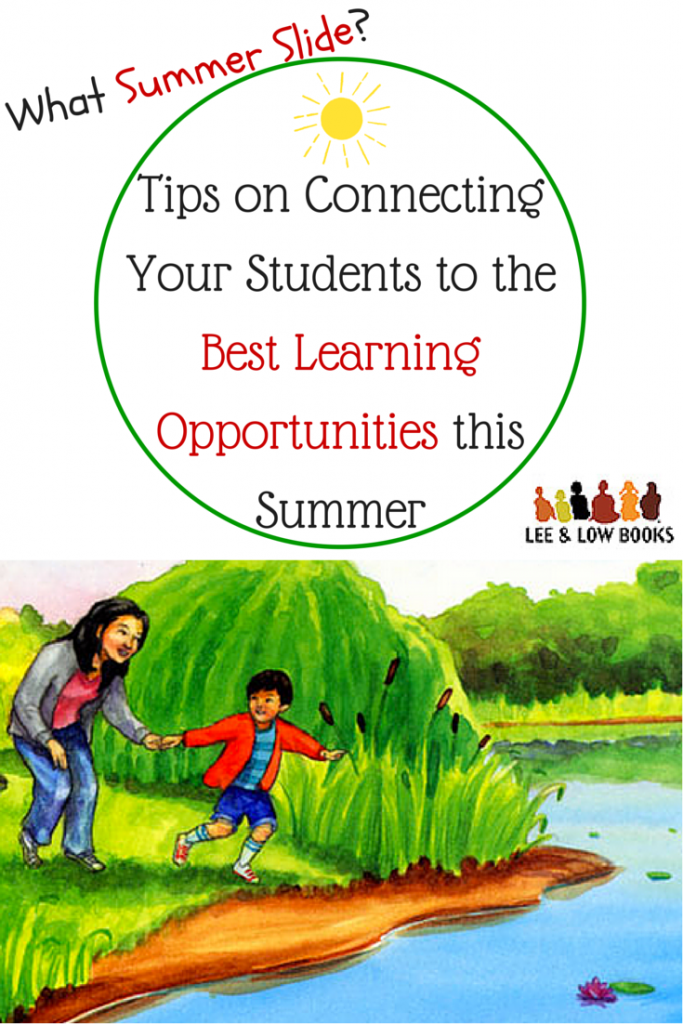You’ve been their teacher for nearly ten months. It seems like only September that a new gaggle of hungry learners entered your classroom. What a journey it has been!
Summer is fast approaching, which means:
 You will not have explicit control over your students’ daily schedules and learning much longer
You will not have explicit control over your students’ daily schedules and learning much longer- Summer slide is a serious risk
- Summer school, camps, and programs are quickly filling up (some by February!)
- Summer learning can make a difference
So in your final guidance to your students and families—help connect them with the right summer learning opportunities!
Summer slide can happen to any student, but is particularly detrimental for low-income children. If you work in a Title I school, for example, families may lack time to research and to apply early, supplemental income to put towards summer programming, or even the language (English) to navigate and negotiate with programs.
Engaging parents in the summer program process is critical. Ten months together with a student and family is significant, but the summer break is a sobering reminder that our time with students is so short (too short) on their grand education journeys.
Reality: We have about 900 hours a year with students, compared to the 7,800 hours students spend out of school. And so, finding a summer learning opportunity for our students is one last opportunity to engage parents as partners and recognize them as the ultimate teachers and advocates of their children.
Why should educators and school staff support with summer planning? Helping families navigate the convoluted summer programs race, you’ll ensure:
- your students retain the growth they achieved with you
- your students find a safe, healthy place to continue learning for the next two months—many of these programs provide not only academic support, but also necessary meal services that families have depended on during the school year
- your students get exposed to new experiences in art, science, music, or sports which will help them build their background schema—a critical reading strategy
- the next grade’s teacher will love you forever (no wants to spend the first month(s) of school re-teaching or reminding students what they already learned, thereby losing precious learning time for new material—full steam ahead!)
FIRST, start your own research now.
- Does your school offer summer school or host a summer day camp?
- Ask around: What programs did your students from last year go to that they would recommend for your current students? What academic programs do your colleagues and administrators recommend? Does the school’s PTA know of local quality opportunities?
- Head straight to the local library in the neighborhood of your school—Many libraries offer summer reading programs and often have a wealth of information on community resources and programs. I have found incredible, meticulously curated binders on health resources, summer camps, preschools, and more in the Children’s Rooms of many public library branches.
Program finders:
- Findyouthinfo.gov’s Map My Community tool helps identify federally supported youth programs in communities
- American Camp Association’s Find a Camp database lets you get as specific as you want in your search for opportunities right for your students and families
- Afterschool Alliance’s Find an Afterschool Program step-by-step guide
- Afterschool Alliance’s Afterschool In Your State map—select your state and then click on the tab “State Network” for state specific program finders
- Not summer programming, but nevertheless worth highlighting: U.S. Department of Agriculture’s Summer Meal Site Finder
- InsideSchools organizes Free Summer Programs by subject
 Questions to consider when looking into programs:
Questions to consider when looking into programs:
- How is reading incorporated? Sports clinics are great for addressing the opportunity gap, but the major goal is to preserve (and hopefully increase) literacy and numeracy
- Is transportation available?
- Are breakfast and lunch provided?
- Are scholarships available? Groups like Wishbone and The Fresh Air Fund can help cover the cost to otherwise out-of-reach high quality programs
- Can siblings of different ages participate?
- Are materials available in other languages or staff members able to communicate with non-English speaking families?
SECOND, begin talking to your students and their families (inquire at after-school pickup and in your final parent-teacher conference). Ask:
- What are your plans for the summer?
- How will your child continue reading practice and discover books?
- Have you ever considered a day camp or summer school program?
- What has been a challenge in finding a program before? (Likely challenges in the past: language, cost, ability to take siblings or multiple age groups, transportation, general convenience, or compatibility with work schedules)
- Discuss summer slide and if/how their child may be at risk. Talk about some ways to prevent summer slide at home and the benefits of local programs.
THIRD, present families with 3-4 programs you have found that are convenient. You do not need to offer families the whole menu of options (thanks, internet) and, frankly, many may not be realistic due to waiting lists, distance, or cost. You know your families and what is doable.
Having said that, you may also discover scholarships to summer programs that your families wouldn’t have even considered—if you can connect them, do it! These are memories your students will have forever.
FINALLY, hold parents accountable. Consider having an after school or morning session with a couple of laptops in your classroom for parents to register and learn more. (In my first year of teaching, my grade level colleague physically connected parents to the registration forms by printing a couple of forms to attach in the summer learning packets and discussed options in the final parent-teacher conference). In this way, you can:
- help families learn about programs near their neighborhood
- answer questions
- provide translation of a website or help make a phone call to specific programs on behalf of families whose first or preferred language to speak in isn’t English
- create a visible support system among families who are also registering, which will increase chances of success for when you are working and studying elsewhere during the summer (as well as help with carpooling!)
Be Pragmatic. Don’t feel like you need to coordinate 30+ students’ summer learning plans and help students decide between sports clinics. Zero in on students whose learning achievements seem the most precarious and you know that if you don’t help point out a summer learning opportunity, they face two months of staying at home with the T.V.
Even if you only get a couple of families (with siblings) registered this time around, next year they will be back championing the experiences and opportunities, and can be partnered with to encourage other families—nothing like seeing someone like you participate to make you rethink what is possible for your family.
- Summer Slide and English Language Learners from ¡Colorín Colorado!
- Bringing Diversity to Summer Reading
- Summer Planning from GreatSchools, source for parents
Jill Eisenberg, our Senior Literacy Expert, began her career teaching English as a Foreign Language to second through sixth graders in Yilan, Taiwan as a Fulbright Fellow. She went on to become a literacy teacher for third grade in San Jose, CA as a Teach for America corps member. She is certified in Project Glad instruction to promote English language acquisition and academic achievement. In her weekly column at The Open Book, she offers teaching and literacy tips for educators.









